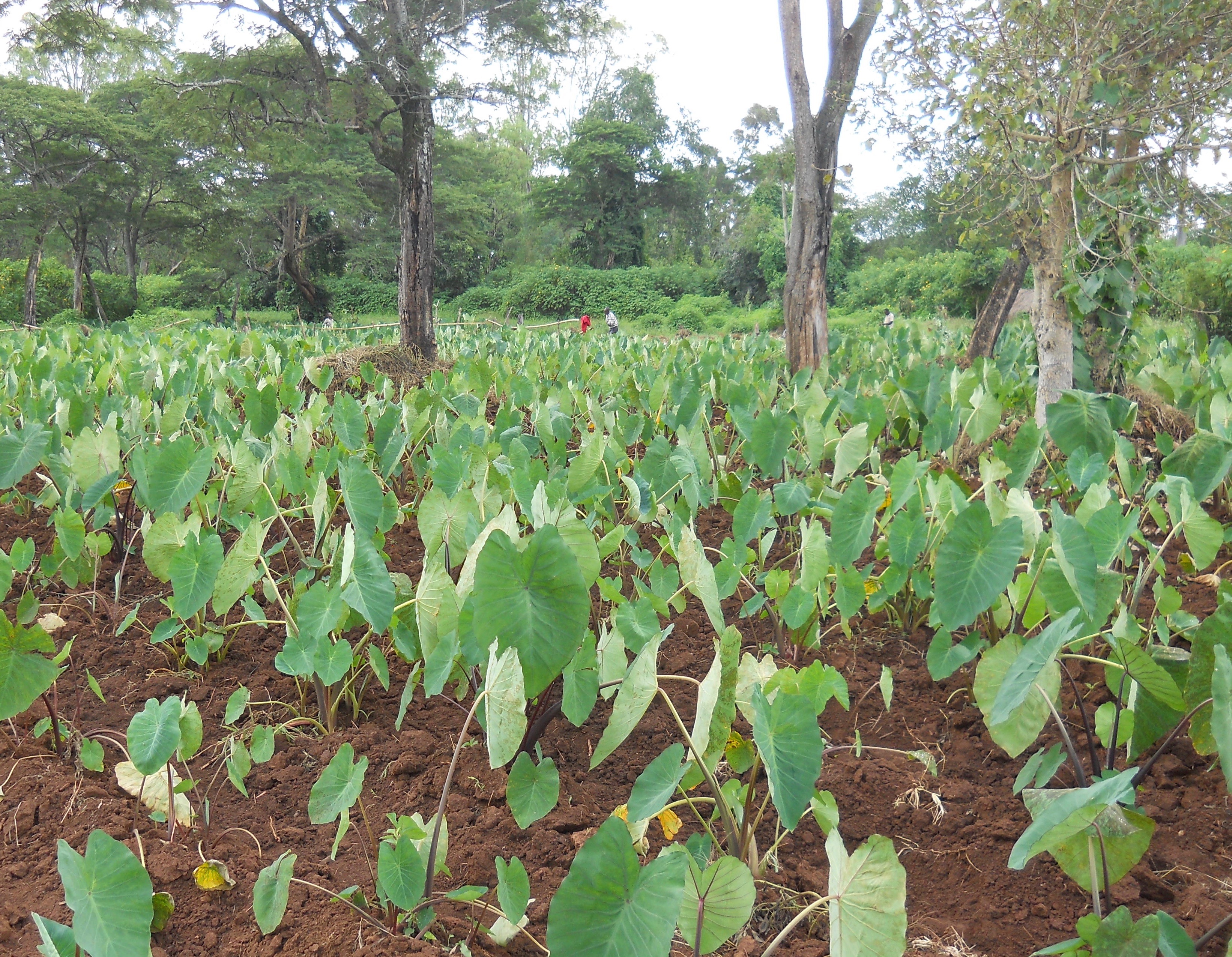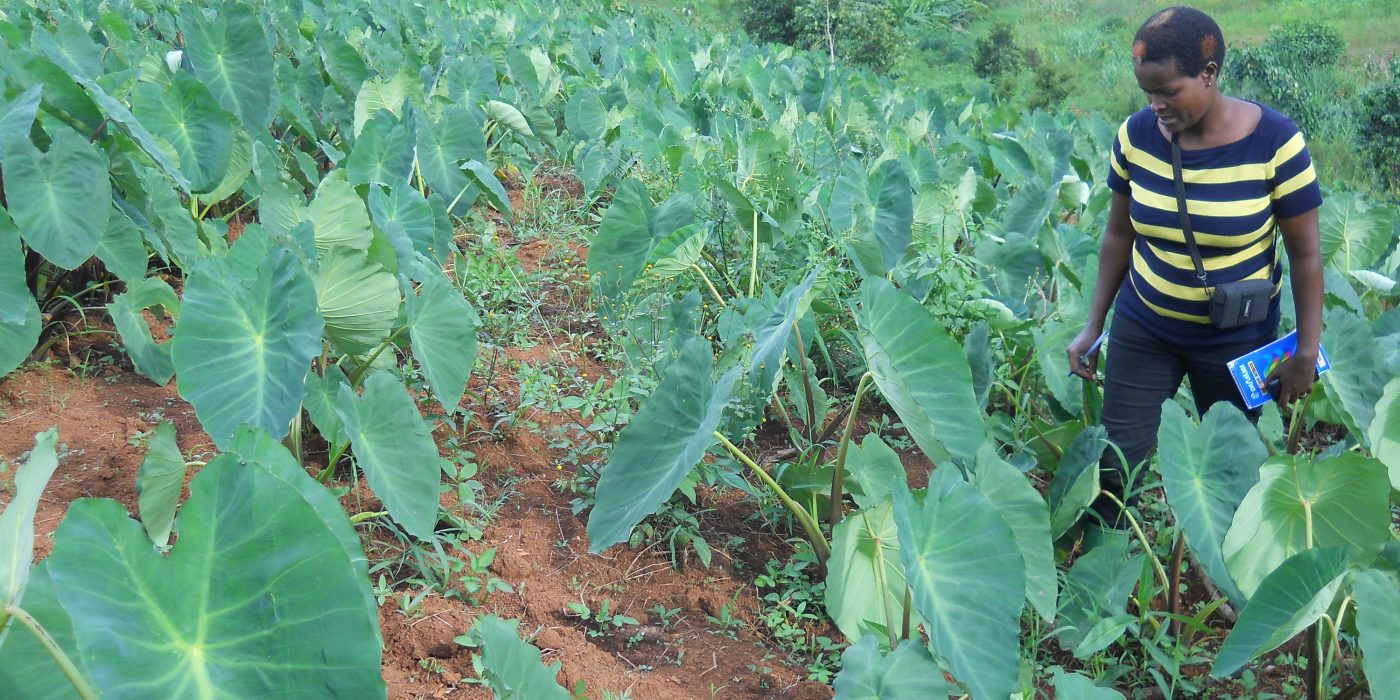SUMMARY
Indigenous cocoyams in Burundi have the potential to increase food and nutrition security and contribute to improved livelihoods, but farmers’ capacity to meet the growing demand for them has been constrained by a lack of good quality seed and technical knowhow. The Good Seed Initiative targeted both seed and cocoyam growers, linking them to markets through an innovation platform approach. Production and use of quality indigenous cocoyam seeds has increased, and cultivation of both seed and cocoyams has increased farmers’ incomes and improved food and nutrition security for their communities. Project approaches such as farmer-to-farmer training, innovation platforms and entrepreneurship have helped achieve sustainable linkages and improved livelihoods.

THE PROBLEM
Indigenous cocoyams (Colocasia esculenta & Xanthosoma sagitifolium) play important roles in nutrition, food security, food diversity, rural development and sustainable land care (NRC, 2006). They are not only consumed as food but also for their preventive and curative medicinal properties (Keding et al., 2007). Awareness of the nutritional benefits of Indigenous cocoyams is growing amongst many East African consumers, elevating their commercial importance (Irungu et al., 2007); this has seen Indigenous cocoyams enter into lucrative markets resulting in better incomes for smallholder farmers in Burundi. However, farmers’ capacity to meet the growing demand for these tubers has been limited by a lack of good quality seed and technical packages (Onim and Mwaniki, 2008). Indigenous cocoyams have not received sufficient attention from research and extension services despite their potential for food and nutrition security in Eastern Africa and especially in Burundi.
Small scale farmers in Cendajuru and Gisuru communes in north-eastern Burundi aimed to partially fill this gap by improving seed systems and enhancing farmers’ access to quality seeds – increasing production, productivity and farm incomes, and impacting positively on food security and economic development. ESAFF Burundi’s work in supporting small scale farmers in the seed sector over the past decade or so has demonstrated that both supply and demand for seed must be addressed. Even in situations where, at the outset, there is apparent unmet demand for quality seed, it can be easy to swing into a situation of oversupply. Notably, initiatives that stimulate the demand for agricultural produce from quality seed have promoted the long-term demand for those seeds. ESAFF Burundi’s activities on indigenous seed took that into account, looking into behaviour change in the indigenous cocoyam sub-sector, creating awareness of the nutritional benefits, creating demand amongst farming communities, and building farmer capacity to meet that demand.
THE SOLUTION
ESAFF Burundi reviewed all links in the indigenous cocoyam value chain from production and sale of seed to growing, trade and consumption – looking to strengthen existing links and create new ones where needed. The following activities were done:
- Assessed training needs to develop relevant training curricula.
- Trained indigenous cocoyam producers in good agricultural practice and linked them to extension services.
- Supported the development of farmer-led seed enterprises.
- Created, supported and improved linkages between seed producers and small- to medium-sized seed companies; and between cocoyam growers and traders.
Promoted awareness of the nutritional benefits of indigenous cocoyams, boosting their consumption and increasing demand for seed and produce.
Farmers were trained on soil and water management, nursery bed establishment, timely planting, water conservation, irrigation and field monitoring to establish extent of diseases/pests and to determine control measures required, and the safe application of pesticides. Seed producers were guided on post-harvest handling of seeds, contract farming and record-keeping. Indigenous cocoyam growers received training on post-harvest handling, processing and marketing of their produce.
The growers went on to train others and through this farmer-to-farmer extension about 1,200 farmers received training.
Community extension workers monitored the quality of this training. Farmer field schools were established by farmer groups, and facilitated by extension workers. These demonstrations enhanced the observational learning of community members.
Seed producers underwent training, registered with the National Office of Inspection and Certification of Seeds (NOICS), produced seed under the Quality Declared Seed (QDS) system, and sold seed within their community or to agro-dealers. Farmers in QDS groups played a bigger role in ensuring access to quality seed for local farmers. The approach hinges on the principle of seed entrepreneurship, producing quality seed to sell to other farmers or other buyers. Promotional activities such as indigenous cocoyam rallies, cookery shows and nutritional outreaches spread awareness of the nutritional benefits and healthy methods of cocoyam preparation, especially to members of pastoralist communities, who are not typically consumers of cocoyams.
RESULTS
- Increased awareness of the benefits of indigenous cocoyams
Over 3,000 farmers attended rallies in Cendajuru and Gisuru. These activities motivated farmers to start growing indigenous cocoyams, by demonstrating the economic advantages over other slower-maturing, labour- and input-intensive crops.
Consumer demand was increased by raising awareness of the nutritional benefits, thus providing ready markets for the farmers’ produce.
- Training and capacity-building of seed producers and cocoyam growers
- Around 200 farmers (60% women) received on-farm training in indigenous cocoyam seed production through farmer field schools, and were given inputs of improved seeds.
- Each farmer shared information with five other farmers so in total around 1,000 more farmers were trained; 80% indicated that they understood and practiced the techniques in which they had been trained.


- Improved quality of, and access to indigenous cocoyam seed
The quality of seeds produced by farmers improved significantly; 60% of indigenous cocoyam seeds passed the minimum standards for germination and purity compared to less than 40% of samples tested previously. Over 1,500 farmers accessed quality seed as a result of ESAFF Burundi seed multiplication activities. Buying from seed producers within the community means farmers buy only the quantity required for a particular season or plot and therefore have the flexibility to operate with the resources available to them at any particular time.
- Boosting rural incomes and livelihoods
The training opened farmers’ eyes to indigenous cocoyam seed production as an alternative income stream and they have ventured into commercial production with an assured market for their seed. Farmers indicated that the short maturity period of cocoyams allows them higher returns per area compared to other cash crops, with two crops able to be harvested per year. Seed producers reported an increase in incomes, enabling families to send their children to school/college, build houses, purchase medical insurance, buy farm animals and diversify into other activities such as poultry production.
- A strengthened indigenous cocoyam value chain
A number of important links and connections were forged, which strengthened the entire cocoyam value chain:
- farmers were linked to extension services and now receive timely advice
- farmers have formed producer groups to support each other and are working together
- farmers were connected to support from the National Office of Inspection and Certification of Seeds (NOICS)
- links have been strengthened between cocoyam growers and traders
- traders take collective orders from growers and are able to save on transport costs
- producers no longer have to walk long distances to market, and can demand higher prices for better and fresher produce
- Improved food and nutrition security
Respondents indicate that they are now more aware of the nutritional and health benefits of indigenous cocoyams. They grow and consume more indigenous cocoyams and have learnt new, more nutritious ways of preparing and preserving them. The project has diversified food sources and contributed to food and nutrition security.
CONCLUSIONS
The project has promoted the nutritional benefits of indigenous cocoyam and supported farmers to produce seed. It has boosted consumption of indigenous cocoyam, driving up demand and production of high quality seed. This provided quality seed at affordable prices for farmers, increasing the production and supply of indigenous cocoyam to consumers. Seed producers achieved a better and consistent market for their seed. Overall income increased for both sellers and seed producers. Innovation platforms creatively and efficiently brought stakeholders together to address problems.

WHAT MORE CAN BE DONE?
To continue mitigating the issues related to food and nutrition insecurity as well as poverty reduction, ESAFF Burundi recommends expanding this project in other communes of Cankuzo province as well as in neighbouring provinces such as Ruyigi and Rutana. Cocoyam growers in project sites can learn processing and post-harvest loss techniques to ensure a supply of cocoyam and seed during the prolonged food shortage periods. Training and extension materials should be produced, including videos and manuals on indigenous Colocasia esculenta & Xanthosoma sagitifolium production and QDS, to be used by all stakeholders.
WHO IS AFSA?
AFSA brings small-scale food producers, pastoralists, fisherfolk, indigenous peoples, farmers’ networks, faith groups, consumer associations, youth associations, civil societies and activists from across the continent of Africa to create a united and louder voice for food sovereignty.
For more information and more African case studies see our website https://afsafrica.org
AFSA encourages the use and reproduction of this case study for non-commercial use provided that appropriate acknowledgment of the source is given.
ACKNOWLEDGEMENT
Author: Augustin Mpawenimana, Country Coordinator, ESAFF Burundi
Email: coordinator@esaffburundi.org
Stay Updated
Keep up to date with all our latest news and events by entering your details below and signing up to our newsletter.
Contact us
For all general enquiries, please contact us
Follow us
Visitors
[powr-hit-counter id=08deb970_1539263115]





























